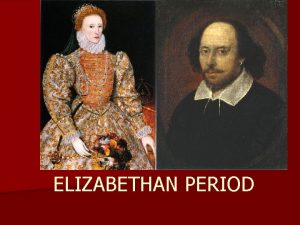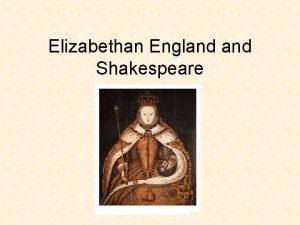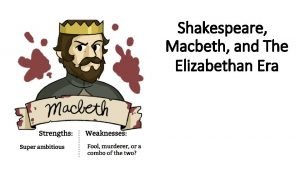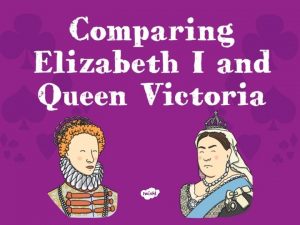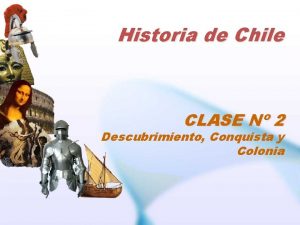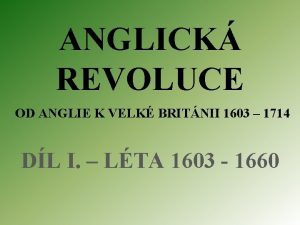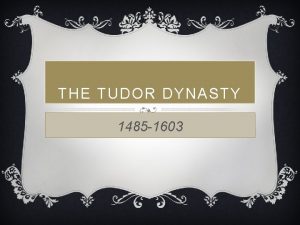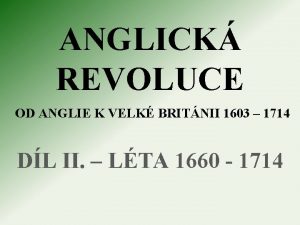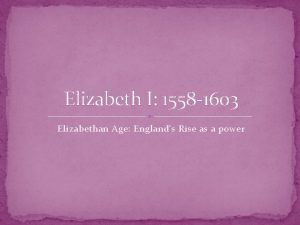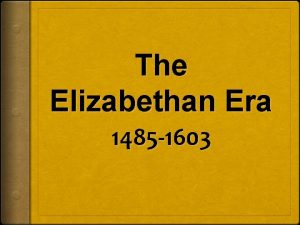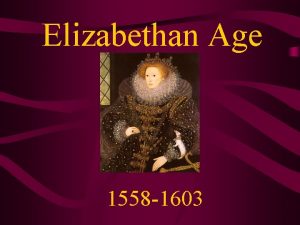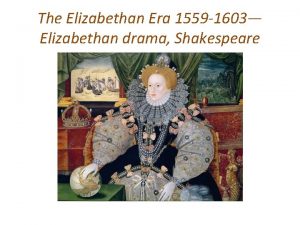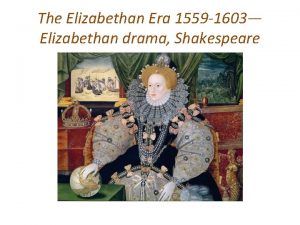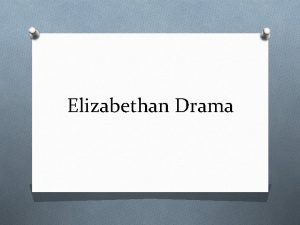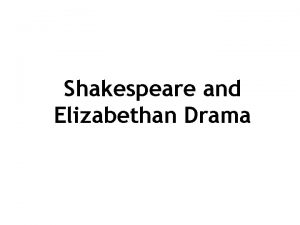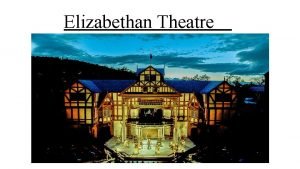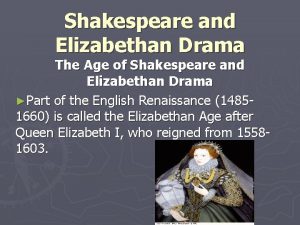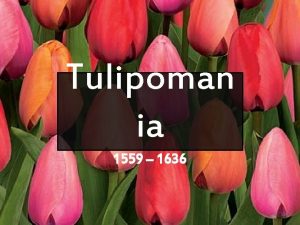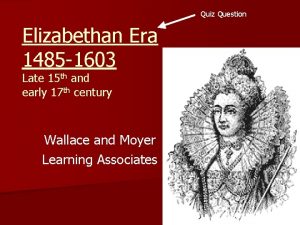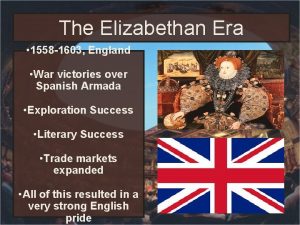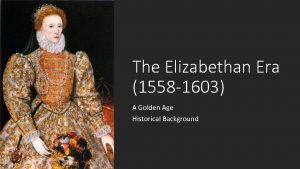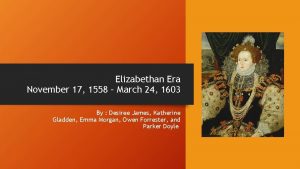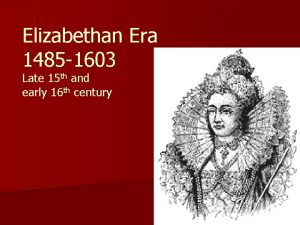The Elizabethan Era 1559 1603 Elizabethan drama Shakespeare

The Elizabethan Era 1559 -1603— Elizabethan drama, Shakespeare

“The development of the professional drama in Elizabethan times would have been impossible without the protection and encouragement of the queen and her Privy Council” Oxford Illustrated History of English Literature, 112

-Public theatres: or public playhouses, go back to the inn-yards where moralities were often performed -first adult companies performed in various places: in great houses, in the hall of an Inn of Court (law school), or in inn-yards. * *from Dr. Dósa’s lecture notes

The Globe theatre -1576: Theatre: the first permanent structure built for the purpose of performances by James Burbage, a professional player. Outside the city limits of London because city authorities were hostile to theatre. -in December 1598 James Burbage’s sons, Richard and Cuthbert, who were associates of Shakespeare’s, dismantled Theatre & used the timber to build The Globe Playhouse on the banks of the Thames within the precincts of London proper -The point of closest contact between humanism and popular taste. *By C. Walter Hodges - Folger Shakespeare Library http: //luna. folger. edu/luna/servlet/detail/FOLGERCM 1~6~6~40370~102858: T he-Globe-Playhouse, -1599 -1613 --Ac? sort=Call_Number%2 CAuthor%2 CCD_Title, CC BY-SA 4. 0, https: //commons. wikimedia. org/w/index. php? curid=34711726

Ben Jonson (1572 -1637) --a friend of Shakespeare’s whose play, Every Man in His Humour was among the first to be performed at the Globe Theatre in late 1598 --inaugurated the so-called comedy of humours, which ridicules the eccentricities or passions of the characters, thought to be caused by physiological imbalance* --Jonson in the prologue: to present "deeds, and language, such as men do use: / And persons, such as comedy would choose, / When she would show an Image of the times, / And sport with human follies, not with crimes. „ --sticks to the Aristotelian unities of action, time and place

Actors: -professional companies of actors attached themselves to noblemen and practically were their servants (e. g. the Lord Chamberlain’s Men, the King’s Men), even though their income came from the public. -all male companies. Female characters were played by young boys until their voices changed, they were apprenticed to leading actors. * *from lecture notes

Who was William Shakespeare?

Born 1564 in Stratford-upon-Avon Shakespeare’s birthplace in Henley Street

• Father, John, was a prominent merchant who suffered financial difficulties later in life, perhaps due to his being a Catholic • Married Anne Hathaway in 1582 when she was twenty-six, and he was only eighteen. They had three children, Susanna, Hamnet and Judith • For his entire professional life, Shakespeare was associated with one theater company, the Lord Chamberlain's Men, known as the King's Men after James I came to the throne in 1603. • Became a leading shareholder in the company and a leading playwright. Sonnets published in 1609. Around 1610 retired to Stratford, where he continued to write plays. No collection of his plays had yet been published when he died in 1616.

Ø None of the manuscript versions of his plays has survived. Eighteen of his plays were published during his lifetime in the small-format, inexpensive books called quartos; to these were added eighteen other plays, never before printed, in the large expensive folio volume of Mr. William Shakespeare’s Comedies, Histories & Tragedies in 1623 Ø Edited by two of his friends and fellow actors, John Heminges and Henry Condell, prefaced by a poem of Ben Jonson’s in which he says that Shakespeare is „not of an age, but for all time. ” *from The Norton Anthology

From mystery and morality plays popular in his childhood Shakespeare learned that dramas worth seeing must get at something central to the human condition. Yet Shakespeare understood that the drama of human destiny is in fact much more compelling when it is attached not to generalized abstractions (e. g. Everyman) but to particular people. „No other writer of his time was able to create and enter into the interior worlds of so many characters, conveying again and again a sense of unique and irreducible selfhood. ” „Shakespeare was singularly alert to the fantastic vitality of the English language…”* *The Norton Anthology

• • Plays: Comedies (Much Ado About Nothing, MND , As you like it, Twelfth Night) Histories (Henry V, Richard III, Julius Caesar) based on Raphael Holinshed’s Chronicles published in 1578 Tragedies (King Lear, Hamlet, Romeo and Juliet, Macbeth)—”…the universe Shakespeare conjures up seems resolutely human-centered and secular. ” – Norton Anthology no single formula for a Shakespearian comedy many comedies move on two planes: light and farcical, while in the background there is an impending disaster, which is successfully diverted at the end no known source for MND “they are almost perfect in their own kind, intricate, witty, lyrical plays…they are mostly lighthearted fantasies, but there are few areas of human experience they do not touch” The Oxford Illustrated History of English Literature, 119 “MND is particularly mischievous in making fun of its own credibility…in emphasizing the insubstantiality of the plays he hints at the insubstantiality of our lives” 120 “MND is famous for its polyphonic construction” 125

Comedy: Definition: a kind of drama which is intended to entertain the audience, and which ends happily for the characters. The characters are primarily flat characters, and serve as to enhance the comic effect. type characters, flat (rascally servant, coward soldier). Romantic comedy: involves idealised lovers sorting out their tangled relationship and achieving happiness. It is light-hearted and unrealistic. Other ingredients: a beautiful heroine sometimes disguised as a man, mistaken identities, difficulties in the attainment of desire, union of lovers, wedding. E. g. A Midsummer Night’s Dream (1594 -96) * *from the lecture notes OTHER TYPES OF COMEDY: SATIRIC COMEDY (AIMS TO RIDICULE, MAKES FUN OF HUMAN FOLLY), TRAGICOMEDY (POSSIBLE TRAGIC EVENTS WHICH NEVERTHELESS END HAPPILY), FARCE (FULL OF THE ABSURD AND LUDICROUS, EXAGGERATED CHARACTERS, IMPROBABLE PLOTS)

A Midsummer Night’s Dream (1595/96) Three plot levels: The nobles: Theseus, Hippolyta, Egeus, Hermia, Lysander, Helena, Demetrius The mechanicals: Bottom, Quince, Starveling, etc. The fairies: Oberon, Titania, Robin Goodfellow (Puck) *Oberon, Titania and Puck with fairies dancing by William Blake

A nature or domestic sprite, demon or fairy

The power of dreams and the irrational power of love: “…’in sleep our fantasy can perceive those truths which are denied to it when we are awake. ’” –The Oxford Shakespeare, 11 “I have had a most rare vision. I have had a dream past the wit of man to say what dream it was. Man is but an ass if he go about to expound this dream. Methought I was—there is no man can tell what…the eye of man hath not heard, the ear of man hath not seen, man’s hand is not able to taste, his tongue to conceive, nor his heart to report what my dream was. ” Bottom

“Methinks, mistress, you should have little reason for that. And yet, to say the truth, reason and love keep little company together nowadays…” Bottom to Titania “Lovers and madmen have such seething brains, such shaping fantasies, that apprehend more than cool reason ever comprehends. The lunatic, the lover, and the poet are of imagination all compact. One sees more devils than vast hell can hold: that is the madman. The lover, all as frantic, sees Helen’s beauty in a brow of Egypt. The poet’s eye, in a fine frenzy rolling, doth glance from heaven to earth, from earth to heaven, and as imagination bodies forth the forms of things unknown, the poet’s pen turns them to shapes, and gives to airy nothing a local habitation and a name. ” Theseus

‘…one must realise what Shakespeare did to the vocabulary at his disposal. He inherited a language that was in the process of expansion by translation and borrowing, a language flexible enough to enable him to cast his own stamp on it, to manipulate it, enlarge it, wrest it to his purpose, with remarkable freedom…. He was conscious…of the advantages to be derived from combining and counterpointing the Anglo-Saxon and Latin elements in English. Above all…language was for him not only expressive but cognitive and exploratory; for him, the nature of reality could be probed by the very fact of rendering it in poetic speech. This great poetic gift was put at the service of an equally great dramatic gift. ’ (Daiches, 307) A Critical History of English Literature
- Slides: 18
